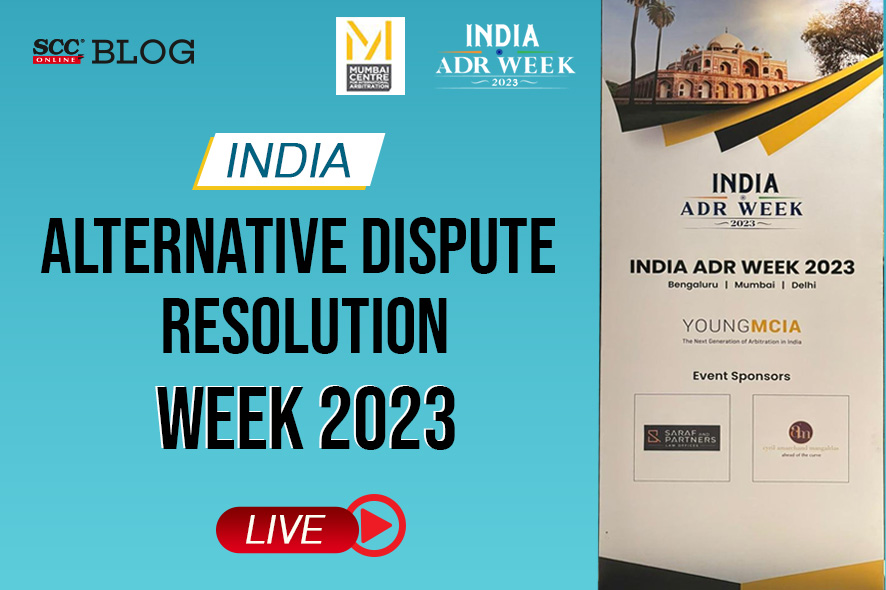India ADR Week, 2023: The Mumbai Centre for International Arbitration (‘MCIA’) brings together the third India Alternative Dispute Resolution Week, 2023. The week is planned in about 40 different sessions with the support of national and international law firms, different arbitral institutions, companies and other arbitral organizations. The event was organised in Bengaluru, Mumbai, and Delhi.
October 14, 2023 at The Oberoi
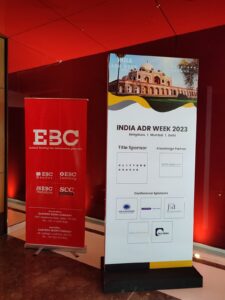
Plenary Session
Mr. Nish Shetty, Partner & Head of Litigation & Dispute Resolution (Asia-Pacific) at Clifford Chance, called for the success of MCIA’s ADR week 2023 wherein, all of the new institutions were part of the week. He added that “It’s not just about MCIA, but it has been really inclusive and that’s to be celebrated.” Regarding the ongoing Tribunal Secretary Training Programme, Mr. Shetty shared that the Idea is to bring in the younger generation into the arbitration world.
SPEAKERS
Chief Guest – Mr. Justice Ravindra Bhat, Supreme Court of India; Guest of Honour – Mr. Justice S. Muralidhar (Retd.), Former Chief Justice, High Court of Orissa
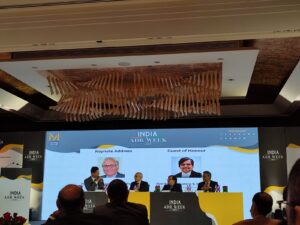
Justice S. Muralidhar pointed towards the two recent changes for people in India including the Govt. notifying Section 10 of the Amendment Act, which brings about Arbitration Council for India. He applauded the fact that there’s a greater awareness for norms to be set, for accountability.
Justice Ravindra Bhat mentioned a Law and Technology event and shared his experience that “What really intrigued me was the common filing system and they obligated parties to de-duplicate to control the weighty documents. This was an eye opener for me.” Justice Bhat also praised that many of their recommendations have now become a law. He further shared his suggestions that “I want an entire Arbitration Bar where set of lawyers are only into arbitration and look at litigation as secondary. The ultimate taste of the cake is how much going out is going to be retained. This culture should translate down to different places, tier two cities. Another project which institutions can take is probono arbitration, arbitrators, since the existing system is available only to those who can afford it. I think the idea of Tribunal Secretary Training is great. They should engage actively with the judicial academy because that’s where you can collaborate with institutions.”
SESSION 1
TOPIC
Disclosure and arbitrator challenges – where do we stand after Halliburton?
SPEAKERS
Mr Daniel Sharma, Partner, DLA Piper; Mr Alexandre Vagenheim, VP Global Legal Data, Jus Mundi; Mr CV Raghu, Group General Counsel, Samvardhana Motherson Group; Mr Dheeraj Nair, Partner, JSA Advocates and Solicitors; Dr John Fletcher, Director, Dispute Resolution, RICS; Ms Jasleen Oberoi, Executive VP, Legal & Secretarial, JCB; Mr Rajshekhar Rao, Senior Advocate, High Court of Delhi

Mr John Fletcher shared about a case wherein the arbitrator did not disclose about being part of a set of prior arbitrations to the parties, a matter which reached the Court. He came up with an important aspect to be considered that whether the reasonable person would perceive the possibility of bias in the arbitration. He explained that “The rule of law says the arbitrator must disclose his involvement. The court came up with consideration of whether such a lack of disclosure would bring a perception of bias in the arbitration process.” Raising a concern over disclosure of being part of multiple arbitration hampering further appointment, he said that “After we are done with the appointment of an arbitrator in a couple of arbitration, should they stop…. In that case, we will run out of arbitrators very quickly. We aren’t facing much of a challenge coming in from anybody about the appointments that we make.”
1. Subjective test to what’s the perspective of parties
2. The objective test of Halliburton – do we need uniform standards for international arbitration.
SESSION 2
TOPIC
Enforcing arbitral awards in India – what can foreign parties really expect?
SPEAKERS
Ms Paula Hodges, Head, Global Arbitration Practice, Herbert Smith Freehills; Mr Amit Sibal, Senior Advocate, Supreme Court of India; Mr Atul Sharma, Executive Chairman, Dentons Link Legal; Mr Joongi Kim, Professor, Yonsei Law School; Mr Ritin Rai, Senior Advocate, Supreme Court of India; Door Tenant, 7 King’s Bench Walk; Mr Vijayendra Pratap Singh, Senior Partner & Head Litigation, AZB & Partners
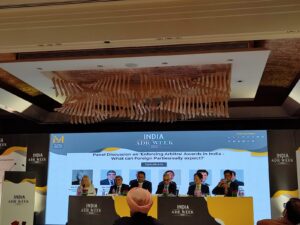
Mr. Vijayendra kickstarted with the discussion with a catchy illustration that “Award enforcement is like an orange, if you got the fruit right, you will get the juice at the end, which may be pulpy if you like it pulpy. If it’s a desi santra, it should be organic – better chance at money. The theme for the day is orange and Atithi Devo Bhava.” Taking the waterfall scenario, he suggested that there’s foreign award, international commercial award then the domestic award. Seeking a statistics based analysis, he added that the Indian courts are enforcing more. He further commented that “Be careful about where you’re seated. Please choose smartly. You’re going to find a lot more of 3As : Accountability, Acceptance and Arbitration – get the thing started and finished.” Comparing the perspective of Indians with foreign food targeting the language of the contract, he suggested that it is good food, but not for my taste buds, who likes a bit of tadka.
Mr. Ritin explained that “A foreign party is equally well placed for International Commercial Arbitration with a seat in India.”
He suggested that there is a need to create two separate regimes of arbitration in India. “Today, an ICA seated in India faces a similar challenge as a foreign award does due to section 34 of Arbitration Act. He also praised that “Our judges can deal with commercial disputes, but courts recognize the vast variety of cases that come up, and leave more and more for the arbitration community. Even for domestic arbitration, you can now have a foreign party having dispute in Andhra Pradesh and choose a seat in Delhi – another positive aspect. Foreign parties need not be as concerned for arbitration in India, as they needed to be earlier. India will always be an interesting place for arbitration and if you blink you will miss out on a development.” Mr. Ritin pointed out that diversity of arbitration in India is an issue for the legislature. He suggested that imperative of having parties coming to an arbitrator in India, the balance has been struck for now.
While commenting On Fraud challenge to foreign award, Mr. Amit Sibal said that “What if there’s no fraud or corruption, what if after delivery of the award, there’s fraud in a contract or transaction which led to the award. English courts have given the answer on fraud or bribery, and the Indian court refused to enforce – an award directed to pay, upheld by the Supreme Court of India. By and large, the message from Indian supreme Court, notwithstanding Devas case, we can find the middle path to fraud that if a party could not raise allegation in the course of arbitration, they should not be allowed to do so later. The court can find fraud even if it’s not there on the arbitral record. There’s a door open to find the fraud during arbitration.” Mr. Amit also expressed on behalf of an arbitrator that “You want to ensure that the substratum of an award is not reduced to a dead letter. Do you have to wait for crossing the line of satisfying the Court that the award is enforceable for interim relief? Do you have the same ability to get interim measures as that of a domestic award? The ultimate purpose of interim relief is to ensure the enforceability of an award.”
Professor Joongi suggested that for investment awards, there are various types. That there’s a divide within the Indian courts regarding enforcement of awards. He went on to explain that the Courts across the world have a very broad definition of ‘commercial’ and added that “Civil law countries tend to be more generous on new evidence on fraud can be a ground for denying enforcement.”
Mr. Atul threw light on another aspect that “Once an award passes through the gate of section 34 or 48, it becomes a final award.
When you’ve got through that funnel, you need to have a valid and enforceable regime for converting that fruit/award into money. Court awarding injunction is something which ultimately falls in the lap of the CPC for enforcement. We always fall short in doing our bit getting the award, injunction. There’s a clear cut distinction between enforcement and recognition. If we look at the whole gamut of cases, we tend to mix the issue of enforceability with jurisdiction. It’s the khichdi which is creating the problem in our understanding, we need to sift and make it worthwhile.” He suggested that the following:
1. Make it mandatory to file affidavit of assets before you go for a challenge
2. Create a regime for registration of charge of judgment debtor
TOPIC
Event hosted by IPBA International Construction Projects Committee
SPEAKERS
Mr. Vyapak Desai, Head, Head, International Dispute Resolution, Nishith Desai Associates; Naresh Thacker, Partner, Economic Laws Practice; Anand Srivastava, Managing Partner, Dentons Link Legal; Amit Kapur, Joint Managing Partner, JSA, Advocates & Solicitors; Ruchika Nyyar, General Counsel, Nexus Malls
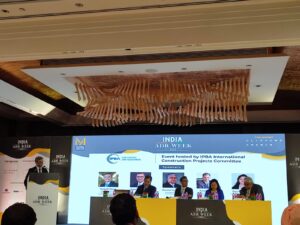 Mr. Amit Kapur questioned the repeated litigation on already settled aspects. He found it very critical for everyone to ensure that advancement of jurisprudence does not get locked out. He explained that “The critical issue arises at the time of bidding of contract, if it’s disclaimed by govt., you have a few months of due diligence and the project takes years. That diligence is impossible.” He went on to suggest the institutions on “Why don’t we consider coming out with a guide on risk allocation?”
Mr. Amit Kapur questioned the repeated litigation on already settled aspects. He found it very critical for everyone to ensure that advancement of jurisprudence does not get locked out. He explained that “The critical issue arises at the time of bidding of contract, if it’s disclaimed by govt., you have a few months of due diligence and the project takes years. That diligence is impossible.” He went on to suggest the institutions on “Why don’t we consider coming out with a guide on risk allocation?”
Ms. Ruchika Nyyar suggested that innovative methods of funding can be brought in, which will give a boost to infrastructure. On arbitration for similar disputes of contruction contracts, she added that “It’s a resolution where a neutral person is deciding for you. The basis is what is the intent of parties to avoid long run litigation.”
Mr. Naresh Thacker pointed out that the lack of standard contract for matters that are not that ‘standard’. He explained the difference of contracts among various parties compared with those between PSUs, and the wider scope left within the clauses, making it difficult for parties supposed to act. He also finger pointed the blacklisting clauses in such contract terms. He said that “We need not ape anyone. Pick a contract right for you and learn to live with it without unnecessary tinkering.” Picking on contracts with examples of roads which is not given at one go but in parts, which makes it impossible for the implementation of a contract to take off, he said that “Challenges faced by people on ground for broken pieces of land to be explained to a judge who is completely unaware and unable to perceive the things on ground for the question of implementation.”
Mr. Anand expressed that Lenders are also stakeholders and the contracts have to interplay much intensely. With the example of faster rails in India, he commented that “Govt is also imagining new ways of managing such transactions.” He pointed out that “Our contracts today do not provide for the distinction of delay, destruction and disruption. Mostly our contracts are employer friendly and various aspects are left for the contractor to manage. Interface management also should be provided.” He went on to suggest that “Lender’s interest is the most significant, while people’s money is at stake. Those lenders need to have a bigger say.”
Closing of the IAW
SPEAKERS
Chief Guest – Mr Justice Vikram Nath, Supreme Court of India; Guest of Honour – Mr. Tushar Mehta, Solicitor General of India

Mr. Tushar Mehta came up with sharing his observations that the focal point of discussion in every similar seminar is how to westernize Indian arbitration, and suggested that “It should be inculcated in an Indian perspective with issue specific solutions. We have not been able to come out with an Indianized version of UNCITRAL, Singapore or like model. Come with something relevant to Indian business concept and also beyond India – international. ‘m not aware what happens after such beautiful events conclude. Someone should write down all the suggestions and analyse implementation of any of those ideas, or consider them for their Acceptability or denial.” Mr. Mehta was cautious while stating that “We do not discard the international scenario but come out with an indigenous model catering domestic needs and fitting in with the international perspective.”
Justice Vikram Nath mentioned Mahatma Gandhi’s keen interest in alternative dispute resolution. He acknowledged that “the Indian legal system has always had arbitration woven into its threads. Laws alone cannot bring change, it’s the judiciary that breathes life into them. Through the Amazon case, the Supreme Court confirmed India’s alignment with international standards of arbitration.” Speaking of artificial intelligence, he commented that Embracing technology comes with the need for caution.
October 13, 2023 at The Oberoi
Session 1
TOPIC
Arbitration Cross Talk by PSL Advocates & Solicitors and YAWP
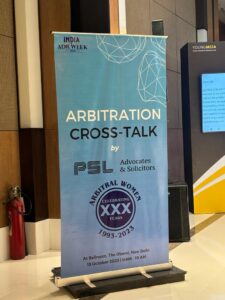
SPEAKERS
Justice Gita Mittal (Retd.), Former Chief Justice of Jammu & Kashmir High Court; Ms. Yuet Min Foo, Director, Dispute Resolution, Drew & Napier LLC; Ms. Manini Brar, Head, Arbridge Chambers, Steering Committee Member, YAWP; Ms. Rebecca James, Partner, International Arbitration, Linklaters; Ms. Jayashree Parihar, Counsel, PSL Advocates & Solicitors
Commenting on the requisite skills, Justice Gita Mittal said that an arbitrator must have good writing and communication skills, have a connect with the parties, and must have the ability to listen to both the sides. According to her, an arbitrator’s perception in the minds of counsel and parties matters a lot. Pointing towards the importance of an award, she added that “What happens to the award does not matter, Justice matters. Arbitrators honesty and efficiency matters.” She was of the view that an arbitrator must be very proactive, fully aware of the material and substantive aspects of the case . Consistency is also very important. Justice Mittal also praised virtual hearings for being cost effective and time saving.
Ms. Rebecca James shared that “Arbitration footprint on environment is huge , virtual hearing has changed that.”
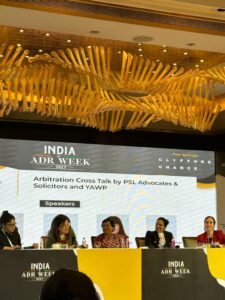
On the ongoing discussion on the characteristics of an arbitrator, Ms. Yuet Min Foo added that Arbitrator must have good organizational skills. On the question of gender issue in appointments, Ms. Foo explained that party nominations are extremely difficult. In Singapore, institutions do a great job in promoting diversity. She also asserted that “In India, it is difficult to break into the circle because it has a habit of nominating a particular set of people as arbitrators.” On difficulties, Ms. Foo added that “In most cases the respondent does not appear. They appear in court proceedings but not before the Arbitral Tribunal, you need to encourage them to appear.” On the concept of virtual hearings, Ms. Foo had a different view, saying that “There is a beauty to physical hearings. You get to see what is going around. However, virtual hearings are more efficient”
Ms. Manini Brar advocated for appointment of young arbitrators while explaining that “When u think about institutions are promoting diversity, the High Courts are also doing this. One must practice the profession with faith and things will work. One must be trained and qualified to be an Arbitrator. One must get all the required qualifications to be a good arbitrator. Arbitrators must have knowledge about the parties , disclosures, what the case is about.”
SESSION 2
TOPIC
Interim Measures in Arbitration and their enforceability in India
SPEAKERS
Justice UU Lalit, CJI (Retd.), Former Chief Justice of India, Supreme Court; Justice B.N. Srikrishna (Retd.), Former Judge, Supreme Court; Justice Deepak Verma (Retd.), Former Judge Supreme Court; Ashwini Kumar, Senior Advocate, Former Union Law Minister; Kailash Vasdev, Senior Advocate
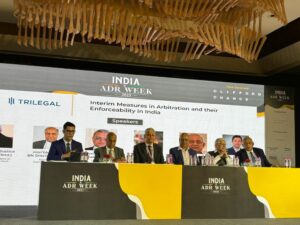
Justice B.N. Srikrishna shared that arbitration proceedings and courts run parallelly, and that the ultimate intention is to lessen the burden of Courts. He also recommended to amend the definition of ‘award’ in order to include the foreign interim award.
Justice U.U. Lalit shared his views on Courts getting clogged, and that’s why the alternative dispute resolution is coming in for disputing parties. Regarding emergency arbitration, Justice UU Lalit said that “Emergency arbitrators also have the same profile, qualifications like the normal arbitrators. Most of the institutions have their internal rules including for the emergency arbitration. Emergency arbitration will always be subject to or submerged in when the Tribunal is constituted. Therefore, let us not complicate things. Don’t elongate the procedure. Thus, there is no need for any separate appellate procedures.” Justice UU Lalit suggested that the recommendations of Justice Srikrishna Committe and the Law Commission Report must be accepted and implemented as early as possible, and added that “There is always a possibility that the emergency arbitrator has granted you the relief but the Court will make modifications to that. The party going through the rigmaroles of proceedings is not feasible”
Mr. Kailash Vasdev added on Emergency arbitrations becoming necessary and being a class in themselves.
Justice Deepak Verma explained the procedural technicalities that “whenever an interim application is filed, it takes a lot of time. Hearing takes around 9 sessions. Tribunal takes time to decide such applications. Thus, emergency arbitration is the solution.” On the need for amendment in the Arbitration and Conciliation Act, 1996, Justice Verma said that it should include foreign seated interim awards, Emergency arbitration should be recognised and these awards be made to be executed in India.
Mr. Ashwini Kumar explained that the purpose of Arbitration Act is to expedite justice and not to delay it, and expressed that “If arbitration as a method of dispute resolution has to be successful it needs to be a speedy process. The arbitral procedure in our country is a never ending procedure. Cutting down the burden of courts was the purpose of arbitration”. Mr. Kumar further pin pointed towards the relevant provisions that “Sections 17 and 9 are interim measures, but when it comes to scope to challenge these measures, there is ambiguity. Section 37 appeal is circumscribed in Section 34. If we need to introduce emergency arbitration, we need to amend Section 2. The question that needs to be clarified is that when we are talking of emergency arbitration, when the contract is signed which include the arbitration clause, emergency arbitration should be envisioned. Clear legislative choice is the need of the hour. When despite the recommendation of 246 Law Commission and Justice Srikrishna Committee’s conscious view of inaction has been taken, that is a legislative choice and not introducing emergency arbitration. Thus, we should have some kind of restraint on judicial law making.”
SESSION 3
TOPIC
Arbitrator’s Disclosure Obligations: When is it Enough?
SPEAKERS
Mr. Justice U. U. Lalit (Retd.); Mr. Baiju Vasani, Barrister & Arbitrator, Twenty Essex Chamber; Dr. Sanjeev Gemawat, Group General Counsel, Vedanta Group; Ms. Smarika Singh, Partner, Shardul Amarchand Mangaldas & Co.; Ms. Ananya Aggarwal, Counsel, Shardul Amarchand Mangaldas & Co. (Moderator)
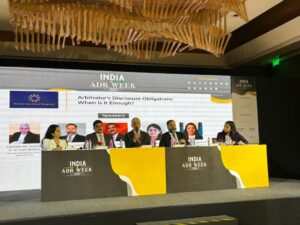
Sharing his views on the topic of discussion, Justice UU Lalit expressed that disclosures need to be very particular, “what is expected of arbitrator in case of disclosures is far to stringent. Whenever in doubt please disclose.” According to him, requirements of disclosures can be multifaceted. Throwing light on the balancing aspect related to disclosures, Justice UU Lalit explained that “It is a very delicate balance and according to me, we are demanding very stringent measures from arbitrators. In arbitration, party autonomy is there, the party nominates, the party selects. Thus, for a judge there is no requirement of disclosures, but for an arbitrator, it is. I always go by this idea that whenever in doubt disclose everything”
Dr Sanjeev Gemawat commented on the importance for arbitrator to disclose everything. He explained that “If you don’t disclose and it is subsequently challenged, then your award will be set aside under section 34.”
On expectations from arbitration, Mr. Baiju Vasani said that “justifiable doubt is the standard – three eyes to determine the justifiable standards
1) eyes of arbitrator,
2) eyes of parties,
3) eyes of objective observers
Mr. Baiju also shared his observations that “I often find that repeated appointments are difficult to prove. It is a very difficult argument. Thus, we note from the public records about the appointment. So, without challenging the appointment we are making the other arbitrators aware of that and conveying to the arbitrator that we are watching you.”
Ms. Smarika Singh pressed on the important aspect that one discloses to what one thinks can be an issue later, that there is nothing as an exhaustive or detailed disclosures. She added that “Arbitrators make good disclosures. The need of the hour is to make good disclosures. It should be detailed and should have balance Everything is available online these days. Whenever a party nominated an arbitrator, they do their research. May be not detailed but they do it.”
SESSION 4
TOPIC
Judicial intervention in enforcement of awards
SPEAKERS
Mr. Promod Nair, Senior Advocate; Ms. Abha Malhotra, Advocate, Delhi High Court; Mr. Gautam Bhatikar, Partner, Phoenix legal; Mr. Senthil Dayalan, Partner, Dentons Rodyk & Davidson; Ms. Priti Suri PSA Legal; Mr. Tejas Karia , Partner SAM & Co.
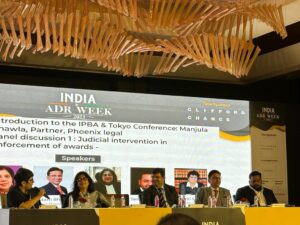
Mr. Gautam Bhatikar started with the specific provisions with reference to judicial intervention that “Earlier, Section 9 was before, during and after. After amendment the ‘during’ part was modified. Section 11 is quite parallel to Section 8. The scope of Section 34 has become narrow after amendment.” He added that “The way forward is try and reduce judicial intervention, promote party autonomy.” He advocated for striking a balance between arbitration and Courts.
Mr. Tejas Karia shared that “I was part of the law commission committee that was drafting the 2015 amendments. The only criticim we are getting is regarding the judicial intervention else we have achieved the 2015 amendments purpose.” On grant of interim relief, Mr. Karia said that the Tribunal can grant the same relief that the Courts can grant, and that the message is to reduce Court’s intervention. Its role in ADR is to support and supervise. According to him, the case of Amazon was an achievement, “what we could not achieve through legislative amendment we achieved through judicial process.” He advocated for having a uniform applicability of public policy by training the judges.
Mr. Senthil Dayalan added another dimension to the discussion that “At this point, everyone comes to Singapore thinking, I get an award in Singapore, or in an arbitration award, and I have to enforce in Singapore, it’s a done thing and it’ll be done within a matter of weeks or months. I have things to share on what the talk on the ground in Singapore is and how we want to actually move away from being so efficient actually, it ties up with this topic. India is trying to push towards minimal cure intervention, whereas UK is now trying to push for some curl intervention.” Mr. Senthil tagged Public policy as a wide and unruly horse.
Ms. Abha Malhotra expressed that “The Renu sagar case is a lamp on the street which has directed the contours of enforcement of foreign award qua public policy. Now, this judgment came around 20 years ago. It was a testament of Court’s maturity. Then came in the case of Phulchand Exports – which expanded the purview of the Public policy under section 48. Then, in ONGC v. Western Geco International 2014, the Supreme Court studied where it could possibly annul an award and it decided to take a hands off approach, so it followed a hands off approach to the extent of not annulling the award, but introduced something called the Wednesberries principle of reasonableness. Now, this again was widely criticized, which was remedied with the amendment.”
Panel Discussion on Third party funding in international arbitration – trends and challenges
SPEAKERS
Mr. Nusrat Hassan, Managing Partner, Dentons Link Legal; Mr. Ajay Bhargava, Partner, Khaitan & Co.; Mr. Naresh Thacker, Partner, Economic Laws Practice; Ms. Neeti Sachdeva, Registrar and Secretary General, MCIA; Mr. Badrinath Durvasula, Ex Managing Director and Legal Advisor: Essar Group; Ms. Shweta Bharti, Senior Partner Hammurabi & Solomon

Ms. Shweta Bharti cited Bar Council of India v. A K Balaji (2015) wherein, the Supreme Court stated that there appears to be no restriction on third parties that is non-lawyers funding the litigation and getting repaid after the outcome of the litigation, along with specifically excluding lawyers from adopting the role of funders. So, while it does exclude the lawyers from the role of being a funder, there’s no such restriction.
Mr. Badrinath Durvasula explained that “In construction arbitration, there are lot of government contracts involved and it involves lot of litigation aspect. We only take up the disputes that we are betting on winning. There are buckets of litigations, we just sort them and take up that we will surely win. Courts need to look at third party funding with a positive aspect. More than a legislation I think a Courts view will be helpful.”
On the question of Can third party funding help in resolving disputes in india?, Mr. Nusrat Hassan explained that “India is going to be one of the biggest construction industry by 2025. Now, obviously the answer to the issues would be of course arbitration. Now, when there is 3rd party funding, the companies give up cases because they cannot afford it. So, it is important to increase access to justice and make it cost effective. Because in large arbitration cases, the lawyer’s fee can go up to millions of dollars. Third party funders are going to have a supervisory role soon.”
Addressing the question of Should a funder be held liable for adverse cost when he was not party to arbitration agreement?, Mr. Ajay Bhargava pointed towards the recent High Court judgments and said that “I don’t think you can implead a third party funder where they are not party to the arbitration. The law around is not settled yet. There is an SLP before the Court, once that is decided we will have clear answers to this.”
Mr. Naresh Thakker explained that “In a 50-50 bargain, the Courts earlier viewed that if money is brought in by a funder, they can be impleaded for costs. This raises a question that once you get what you wanted, you are putting interest on these fundings, which is actually an unconscious bargain. The Courts are actually looking at this aspect. So, third party funding is actually accepted in India today. But courts are looking at the interests of the funders as to what interest they have in these fundings.”
Ms Neeti Sachdeva explained that “Arbitration Institutions have their own rules, but don’t have an underlying legislation on third party funding. MCIA does not have it. When rules come in, it will be all put together. Third party funding is definitely out of the dusty doctrines of champerty and maintenances. Having a legislation to backup the rules of arbitration institutions regarding third party funding is important, otherwise it will be a situation like emergency arbitration where all the institutions are doing it but then it goes on to being tested.”
October 12, 2023 at Hyatt Regency
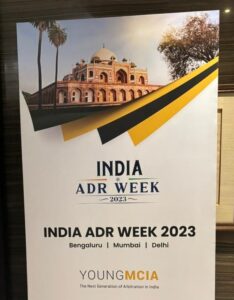
SESSION 1
TOPIC
How Technological Advancements are Reshaping the Dispute Resolution Process: Digitization of. Documents , Discovery, Virtual Courtroom proceedings, Admission and Preservation of Evidences.
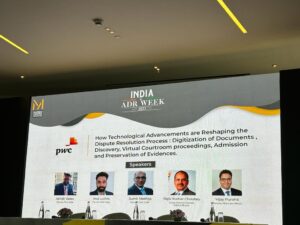
SPEAKERS
Puneet Garkhel, Partner & Leader, Forensic Services, PwC India; Atul Luthra, Partner, PwC India;Rajiv Kumar Choubey, Group General Counsel, Dalmia Bharat; Vijay Purohit, Partner, P&A Law Offices;Sumit Makhija, Partner, PwC India; Abhijit Yadav, Partner, PwC India
Speaking on technological advancements and digitisation of documents Vijay Purohit said that “Covid taught us that hearings, documents, evidences can be managed online with all the efficiency. It’s a great transition. So we have come quite far from where we were. The future will be better with a measured use of technology”.
Sumit Makhija said that “technology has changed our lives for the better. Its shaping multiple things for the dispute resolution process. Earlier it was tedious process with numerous files, now it is changing. Case scenario are being built with party modelling”.
He further added that “tampering of evidence can be avoided with online documents. The numbers are running into millions where we are examining the documents with the tools, all in span of 15 minutes”
He said that “in our country, there are lot of delay, which is the major issue. So, he suggested that the use of technology , like blockchain to ensure authenticity, is the way. Also, there is a need for right use of experts to speed up the process”.
Atul Luthra remarked that “technology has all the power to build”. Agreeing with Sumit Makhija, he said that “ technology is changing for better”.
He explained 4 key components of data:
- How do I prevent my data.
- Accessibility of the data.
- How efficient is the key to the data.
-
Quality.
He further quoted that the base line and consistency with the data is very important.
Giving a live example of technology advancement, he said “ there is a tool here which is recording all that we are speaking. Easing all the 2 days work in seconds”. He said there are two kinds of Artificial intelligence one is Chat GPT and other is custom training of any system.
Abhijit yadav remarked that “it is not about finding the needle in the haystack. But finding the whole hay itself”. He further said that “Sumit made a very relevant point with efficiency of technology. How do all the stakeholders trust the system?”
On data analysis and productive modelling, he said that “authenticator, chain of custody, this has all built the confidence in these tools, provided that there is education about these. As the ecosystem gets used to, the comfort level will increase”.
Vijay Purohit stated that “a lot depends on the party, that how the parties filter the data and how it is being presented to the tribunal. These bundles of data are filtered with the parties consent, to minimise Authenticity questions”.
Further, he said that “ when it comes to physical hearing you have to search documents and all, but now it is all different. So, it all depends on parties, if arrived at a consensus for authenticity”.
He said there are instances of courts deciding the principles of gut feelings. In principles, a lawyer has to a take a decision on basis of morals at times, say whether to go for dispute resolution or litigation.
On virtual courtroom proceedings, Vijay Purohit said that “there are 3 -4 elements to this. Virtual hearing has become the preference today as it saves costs, time. It has made a difference in terms of procedure, witness testimonies and logistics also”.
He added that “the way evidences are presented has changed. For example, the email correspondence between parties has definitely changed, now the parties cannot deny that an email was received or sent”.
He quoted that “ hybrid is the norm, training is the way forward”.
SESSION 2
TOPIC
Navigating the Future of International Arbitration in the Asia Pacific Region
SPEAKERS
Mr. Danesh Chandran, Assistant Director, AIAC; Mrinal Jain, Managing Director, Secretariat’s Economic Damages and Valuation Practice; Abinash Barik, Co-Founder & Partner, Finvest Legal; Dr. Harald Sippel, Foreign Lawyer, Skrine; Ms. Ng Chu Yin, Arbitrator , AIAC ; Ms. Bhavani Singh , International Case Counsel, AIAC ; Ajay Thomas, Independent Arbitrator and ADR Consultant

Speaking on the future of International Arbitration in the Asia Pacific Region, Ajay Thomas said that the focus of international
Arbitration has shifted to India. He further said that the Guru Nanak Foundation v. Rattan Singh, (1981) 4 SCC 634 is a contribution to arbitration in the Asian region. As per him from landscape and institutional perspective India is flourishing.
He further stated that “all the States in the Asian region have arbitration centres, say Bhutan, Bangladesh, India, Singapore, etc. , institutional arbitration is quite intense in this region. It is a very competitive environment in this region”.
On cooperation amongst the arbitration centres , he said that “the quality, robustness of these centres is dependent on the operators of these centres, as to what extent they are cooperating with other arbitration centres”.
He added that he believe that institutions must cooperate with each other. As per him, the market is dominated by ad-hoc arbitration. 80% market of India is ad-hoc arbitration. So, the competition is not the arbitration institute but ad-hoc arbitrations.
He also added that Online Dispute Resolution (‘ODR’) is going to be very active in the coming years.
Ng Chu Yin said that “the AIAC has adopted the simpler way of rules and summary determination. The reason to include summary determination is that some of the parties and tribunals are not familiar with the summary determination, so this was included it in the 2023 rules”.
On monetary allocation in the third party funding and the disclosures about them, she said that “by knowing that who is financing the proceedings we can determine the conflict of interest, if any. The AIAC has included the same provision in its 2023 rules”.
Dr. Harald Sippel said that “ Malaysia is viable substitute to Singapore because a lot of Malaysian laws are favourable. The Malaysian contract act is based on Indian contract Act. Decisions by Indian courts are persuasive in Malaysia. They are not precedents but are persuasive”.
He said that the AIAC is a viable alternative to SIAC, for the following reasons:
- The costs at AIAC are appropriate. It is fairly low.
-
The facilities are the best in the world. It has bagged a price for the same.
On apportionment of costs and conduct of proceedings, Abinash Barik gave some factors to be considered for arbitral tribunal’s authority to allocate costs:
- The applicable law
-
Agreement of the parties
He suggested the need to have more and more trained arbitrators. He said that “ this is the clients request today , they wish to have a trained arbitrator or expert, in order to save time and costs.
Mrinal Jain said that “an economists role is very crucial in arbitration. The damages expert quantify the damages, claims and losses that could involve complex economic and financial violations”.
He said that he has analysed the delay days and has assisted the arbitrator in attributing that delay to the party.
He emphasised that the role of technical experts is very crucial. However, if it’s a sole arbitrator case, the parties won’t agree to appoint a non lawyer arbitrator. This is the practical challenge that we face today while stressing on the appointment of technical experts.
SESSION 3
TOPIC
De-risking International Arbitration
SPEAKERS
David Elsberg, Founding Partner, Selendy Gay Elsberg; Vivek Tata, Senior Associate, Selendy Gay Elsberg ;Divyam Agarwal, Partner, JSA; Anurag Sharma, General Counsel, Makemytrip
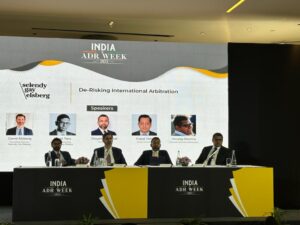
On problem of needing documents in arbitration, particularly documents that are held by a non party, David Elsberg said that “a US Supreme Court case that came out pretty recently narrowed the ability to gets documents through Section 1782 of the Title 28 of the US States Code. There are couple of ways to get documents from the US for use in Indian arbitration, despite this US SC Case”.
On how to bind the parties, he said that “there are jurisdictions like New York which say that sentence which refers to binding all of the related entities, it only binds the affiliates and other entities that were in existing at the time of contract was being written. If any new subsidiary is created, the assets are transferred. And then you end up getting into dispute with these parties”.
On controlling the costs of arbitration clauses, he said that “it is important to include that what type of discoveries will and will not be allowed. It is also important to include a clause of scope of arbitration”.
Divyam Agarwal added that in India, document production exercise even for third parties is not used by many people. Section 27 of Arbitration Act , 1996 permits parties to aid court in furtherance of arbitration.
He further stated that if one does not want a party to join and limit their participation, there is a common phrase – necessary and a common party. So, one can always delineate them from the necessity part of it.
Anurag Sharma remarked that the problem comes that when you are drafting clauses of arbitration, it will be a dormant clause for 99%.
Pointing out the challenges that we face when arbitration starts, he said that “ in the beginning the energy levels are high , but later fatigue kicks in. The counsels just accept whatever the provision. So ,we need to pay attention that focus is being paid to the details of the clause”.
He further said that “ when we raise a question of arbitrators bias, the bias becomes stronger if we fail in pointing that bias”.
Agreeing to this, David Elsberg said that “ if you shoot at the king, you must kill him”.
Vivek Tata questioned that when we have passed this contract drafting phase , What are the things that can be done to bypass the biasness shown in the agreements of the Clause?
Where should we seek the relief?
He further said that “the Courts in US expect that we act when a bias is seen. You have to continue your diligence as arbitrations are happening”.
SESSION 4
Sanctions and International Dispute Resolution
SPEAKERS
Rishab Gupta, Advocate, Bombay High Court;Barrister, Twenty Essex Baiju Vasani, Barrister, Twenty Essex ;Rajat Rana, Partner, Selendy Gay Elsberg;Piyush Joshi, Partner, Clarus Law Associates; Samantha Rowe, Partner, Debevoise & Plimpton ; Dipen Sabharwal KC, Partner, White & Case ;Niyati Gandhi, Principal Associate, Shardul Amarchand Mangaldas.
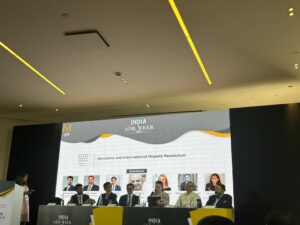
On interplay of various sanction regimes Rishab Gupta said that India does not have a specific sanction regime.
He further talked about special equity defence, and on the question that what can an Indian company do to avoid the disputes related to sanctions, he said that “the reality is that no one gets involved in these sanctions disputes. From an economic and geopolitics standpoint it’s actually beneficial”.
He further added that “ the only way to deal with it is to get away with the jurisdictional nexus because if you try to get away with it after establishing the jurisdictional nexus, you will just be looking at balancing the penalties”.
Piyush Joshi added that “there is a need for India to make a legal framework for sanctions”.
He further viewed that India is not clear on the stance of sanctions. So, India should focus on law around sanctions.
Dipen Sabharwal KC, said that “performances of contract gets affected by sanctions”.
On unexpected restrictions on commercial arbitration, he said that “ institutions have a big role , they can mitigate the effects” While citing an example, he said that “if the ICC does all of its business in dollars. It’s activities are impacted by sanctions which impacts the administration of arbitrations. So, institutions have a big role to provide certainty and comfort”.
Baiju Vasani said that “ sanctions do not actually change the conduct, but realign geo-politics of this world”.
He remarked that “Russians love litigating and arbitrating in London”.
On the question that if investors are using investment investor state dispute settlement to challenge sanctions, he said that “sanctions are not effective , one has to look at how sanctions come into being and also how they are applied”.
On how Russians are dealing with the sanctions, Samantha Rowe said that “when the Russian Courts were faced with these procedural rules of 2020, they said that it will not be a bar to access justice. The courts refused to assume jurisdiction under these new rules.
On enforcement of Judgments Rajat Rana said that “ you don’t have to wait till the sanctions regime passes to start enforcement proceedings”.
SESSION 5
The Unsettled Territories in Indian Arbitration by NPAC
SPEAKERS
Payal Chawla, Founder, JUSCONTRACTUS;
Anirudh Krishnan, Founding Partner, AK Law Chambers; Shreyas Jayasimha, Counsel, Arbitrator, Mediator, Aarna Law (India) Simha Law (Singapore); Renu Gupta, Olive Law, Founding Partner
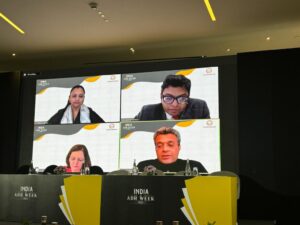
Anirudh Krishnan talked about unilateral appointments.
He said that “the scope of challenging an award has been significantly narrowed down. Two views are possible, one in furtherance of neutrality and the test for neutrality is appointee centric.
The legislature can clarify the stance and incorporate Perkins ratio”.
On Section 12(5) of the Arbitration Act , Payal Chawla said that “ its always better to be cautious, to put requisite disclaimers”.
Commenting on either of the party, especially who is in the lower bargaining position, Renu Gupta said that “the idea of equality starts from the constitution of Tribunal . The unilateral appointment kills that idea”.
She said that “our Courts are losing out on deciding several jurisprudential matters”. she cited the case of Anupam Mittal v Westbridge , which was decided by a Singapore Court and not an Indian Court.
Shreyas Jayasimha talked about contractual enforcement.
SESSION 6
TOPIC
Panel Discussion on ‘Reforms in Indian Arbitration Law: What to expect and global best practices?’
SPEAKERS
Shreya Aren, International Arbitration Associate, Debevoise & Plimpton, London; Co-Chair, Steering Committee, Young MCIA; Shouvik Bhattacharya, Senior Associate, King & Spalding, London;Arush Khanna, Partner, Numen Law Offices, New Delhi;Mayank Mishra, Partner, Indus Law, New Delhi;Manmeet Singh, Partner, Saraf & Partners, New Delhi; Daniel Cai, Dispute Resolution , Drew and Napier LLC
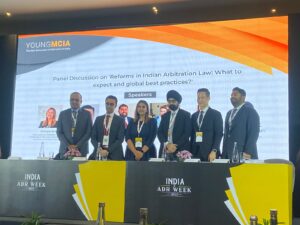
Arush Khanna said that “ in the pre invocation stage, before the amendment, the courts had the wider canvas to make a roving inquiry into issued surrounding the arbitration agreements”.
He said that “ a canvass was later narrowed down, and a non- obstante clause was introduced”.
He added that “ in the post invocation stage, the arbitrator had to before accepting appointments had to state whether he or she has a relationship with the matter at hand or with any of the parties”.
On the current arbitration regime in india and the need for reforms in 2023, Manmeet Singh said that “we have to aim higher and see that whether we can offer India as a platform for International Arbitration. But, this needs to be supported by enabling legislation”.
He suggested that “its important to consider if we require a separate statutes for domestic and International arbitration”.
Mayank Mishra said that “ we need to focus on post award support”. He pointed out that “we have 51000 applications pending in Delhi and Bombay High Courts”. Amongst these, there are 10 percent petition pending for enforcement.
He suggested for default set of procedural rules which are aimed at guiding the ad hoc arbitration and simplify the rules for taking evidences and document productions.
He further emphasised on the importance of adopting technology to make arbitrations Cost effective. He said “ tools should be incorporated for proving joinder and consolidation in ad hoc and multi party arbitrations”.
Daniel Cai talked about arbitrations in Singapore. He said that “arbitration Act in Singapore was amended to introduce a default made appointment of the arbitrators in multiparty situations where agreements do not guide on the appointments”.
He added that the SIAC model clause was amended, to choose Singapore international Commercial Court as a supervisory court for arbitration.
Commenting on the recent judgment passed by the Supreme Court of India regarding unstamped arbitration agreements, he said “ it raises issues regarding the interplay between the stamp Act and arbitration for the separability doctrine.
On UK’s arbitration reforms Shouvik Bhattacharya said that “ we received responses from around 118 consultees. Those consultees ranged from individual practitioners, through academics and specialists and the domestic and international institutions”.
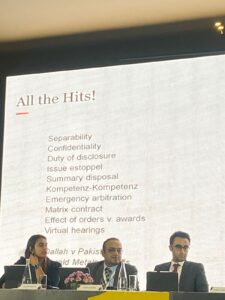
He also emphasised the need for a separate Act for domestic and International arbitrations.
He suggested that the lessons of the English arbitration act should be taken in India with tempered enthusiasm.
He recommended that “the Arbitration Act 1996 should provide that arbitrators have a continuing duty to disclose any circumstances which might reasonably give rise to justifiable doubts as to their impartiality”.
He further recommended that “an arbitrator should be under a duty to disclose what they actually know and what they ought reasonably to know , that an arbitrator should incur no liability for resignation unless the resignation is shown to be unreasonable”.



